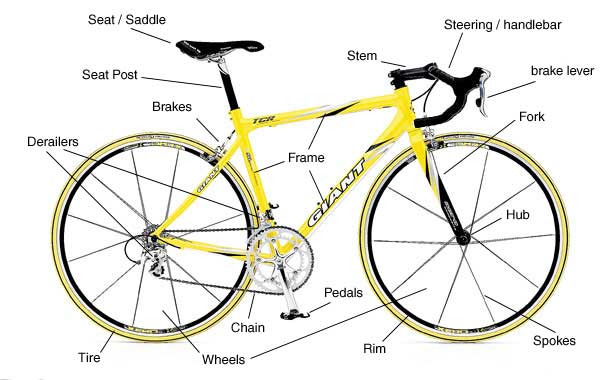

2 minute bike check
- Make sure your CPSC or Snell-approved helmet is on top of your head with straps fastened and tight (1 finger-breadth maximum) beneath your chin.
- Straddle your front wheel and attempt to twist the handlebar. It should not move relative to the wheel.
- Check front tire pressure by squeezing it with your hand. For a road bike, there should be no give. For a hybrid or mountain bike, you might be able to indent the tire 1/8 inch.
- Check front wheel quick release, it should be in the locked position.
- Pick the front wheel up slightly and give it a forward spin. It should spin freely without rubbing against the brake shoes.
- Apply the front brake. The brake shoes should contact the rim, not the tire. Attempt to push the bike forward with the brake applied. The front wheel should lock and the rear wheel should come off the ground.
- Spin the pedals. They should spin freely.
- Attempt to pull the crank arms side to side. There should be no movement.
- Attempt to jiggle the seat. It should not move, unless it's a suspension seat. The seat post should not move relative to the frame.
- Check rear tire pressure by squeezing it with your hand. For a road bike, there should be no give. For a hybrid or mountain bike, you might be able to indent the tire 1/8 inch.
- Check rear wheel quick release, it should be in the locked position.
- Pick the rear wheel up slightly and give it a forward spin. It should spin freely without rubbing against the brake shoes. Articles on a rear rack should not dangle into the wheel or spokes.
- Apply the rear brake. The brake shoes should contact the rim, not the tire. Attempt to push the bike backward with the brake applied. The rear wheel should lock and the front wheel should come off the ground.
- Pick your bike up off the ground 6 inches and drop it, to simulate a pothole. Objects should not fall off your bike with this maneuver

2 minute bike check list



